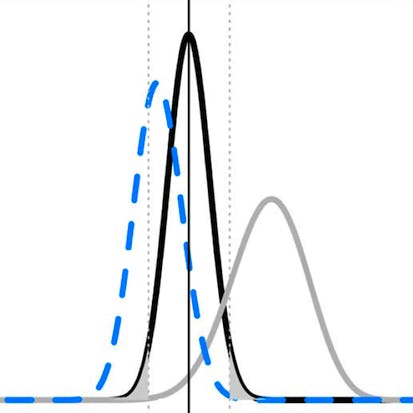- Level Professional
- Duration 28 hours
- Course by Eindhoven University of Technology
-
Offered by

About
This course aims to help you to draw better statistical inferences from empirical research. First, we will discuss how to correctly interpret p-values, effect sizes, confidence intervals, Bayes Factors, and likelihood ratios, and how these statistics answer different questions you might be interested in. Then, you will learn how to design experiments where the false positive rate is controlled, and how to decide upon the sample size for your study, for example in order to achieve high statistical power. Subsequently, you will learn how to interpret evidence in the scientific literature given widespread publication bias, for example by learning about p-curve analysis. Finally, we will talk about how to do philosophy of science, theory construction, and cumulative science, including how to perform replication studies, why and how to pre-register your experiment, and how to share your results following Open Science principles. In practical, hands on assignments, you will learn how to simulate t-tests to learn which p-values you can expect, calculate likelihood ratio's and get an introduction the binomial Bayesian statistics, and learn about the positive predictive value which expresses the probability published research findings are true. We will experience the problems with optional stopping and learn how to prevent these problems by using sequential analyses. You will calculate effect sizes, see how confidence intervals work through simulations, and practice doing a-priori power analyses. Finally, you will learn how to examine whether the null hypothesis is true using equivalence testing and Bayesian statistics, and how to pre-register a study, and share your data on the Open Science Framework. All videos now have Chinese subtitles. More than 30.000 learners have enrolled so far! If you enjoyed this course, I can recommend following it up with me new course "Improving Your Statistical Questions"Modules
Course Introduction
2
Assignment
- Consent Form for Use of Data
- Pop Quiz!
1
Videos
- Introduction
3
Readings
- Structure of the Course
- Passing the Course
- Research on Quizzes
Week 1: Overview
1
Readings
- Week 1: Overview
Lecture 1.1
1
Videos
- Frequentism, Likelihoods, Bayesian statistics
Lecture 1.2: What is a p-value?
1
Videos
- What is a p-value
Lecture 1.3: Type 1 and Type 2 errors
1
Videos
- Type 1 and Type 2 errors
Assignment 1: Which p-values can you expect?
1
Assignment
- Answer Form Assignment 1 : Which p-values can you expect?
1
Readings
- Assignment 1: Which p-values can you expect?
Exam Week 1
2
Assignment
- Pop Quiz 2!
- Exam Week 1
Week 2: Overview
1
Readings
- Week 2: Overview
Extra: Interview with Zoltan Dienes
1
Videos
- Interview: Zoltan Dienes
1
Readings
- Interview with Professor Zoltan Dienes
Lecture 2.1
1
Videos
- Likelihoods
Assignment 2.1: Likelihoods
1
Assignment
- Answer Form Assignment 2.1
1
Readings
- Assignment 2.1: Likelihoods
Lecture 2.2: Binomial Bayesian Inference
1
Videos
- Binomial Bayesian Inference
Assignment 2.2: Bayesian Statistics
1
Assignment
- Answer Form Assignment 2.2: Bayesian Statistics
1
Readings
- Assignment 2.2: Bayesian Statistics
Lecture 2.3: Bayesian Thinking
1
Videos
- Bayesian Thinking
Exam Week 2
2
Assignment
- Pop Quiz 3!
- Exam Week 2
Week 3: Overview
1
Readings
- Week 3: Overview
Lecture 3.1: Type 1 error control
1
Videos
- Type 1 error control
Lecture 3.2: Type 2 error control
1
Videos
- Type 2 error control
Assignment 3.1: Positive Predictive Value
1
Assignment
- Answer Form Assignment 3.1: Positive Predictive Value
1
Readings
- Assignment 3.1: Positive Predictive Value
Assignment 3.2: Optional Stopping
1
Assignment
- Answer Form Assignment 3.2: Optional Stopping
1
Readings
- Assignment 3.2: Optional Stopping
Extra: Interview with Professor Dan Simons
1
Videos
- Interview Professor Dan Simons
1
Readings
- Interview Professor Dan Simons
Lecture 3.3: Pre-registration
1
Videos
- Pre-registration
Exam Week 3
1
Assignment
- Exam Week 3
Week 4: Overview
1
Readings
- Week 4: Overview
Lecture 4.1: Effect Sizes
1
Videos
- Effect Sizes
Lecture 4.2: Cohen's d
1
Videos
- Cohen's d
Lecture 4.3: Correlations
1
Videos
- Correlations
Assignment 4: Calculating Effect Sizes
1
Assignment
- Answer Form Assignment 4: Effect Sizes
1
Readings
- Assignment 4: Calculating Effect Sizes
Exam Week 4
2
Assignment
- Pop Quiz 4!
- Exam Week 4
Week 5: Overview
1
Readings
- Week 5: Overview
Lecture 5.1: Confidence Intervals
1
Videos
- Confidence Intervals
Assignment 5.1: Confidence Intervals and Capture Percentages
1
Assignment
- Answer Form Assignment 5.1: Confidence Intervals and Capture Percentages
1
Readings
- Assignment 5.1: Confidence Intervals
Lecture 5.2: Sample Size Justification
1
Videos
- Sample Size Justification
Assignment 5.2: Random Variation and Power Analysis
1
Assignment
- Answer Form Assignment 5.2: Random Variation and Power Analysis
1
Readings
- Assignment 5.2: Random Variation and Power Analysis
Lecture 5.3: P-Curve Analysis
1
Videos
- P-Curve Analysis
Exam Week 5
2
Assignment
- Pop Quiz 5!
- Exam Week 5
Week 6: Overview
1
Readings
- Week 6: Overview
Lecture 6.1: Philosophy of Science
1
Videos
- Philosophy of Science
Lecture 6.2: The Null is Always False
1
Videos
- The Null is Always False
Assignment 6: Equivalence Testing
1
Assignment
- Answer Form Assignment 6: Equivalence Testing
1
Readings
- Assignment 6: Equivalence Testing
Lecture 6.3: Theory Construction
1
Videos
- Theory Construction
Exam Week 6
1
Assignment
- Exam Week 6
Week 7: Overview
1
Readings
- Week 7: Overview
Lecture 7.1: Replications
1
Videos
- Replications
Lecture 7.2: Publication Bias
1
Videos
- Publication Bias
Lecture 7.3 Open Science
1
Videos
- Open Science
Assignment 7: Open Science
1
Peer Review
- Assignment 7: Open Science
Practice Final Exam
2
Assignment
- Pop Quiz 6!
- Practice Exam
Graded Final Exam
1
Assignment
- Graded Final Exam
Auto Summary
"Improving your statistical inferences" is a comprehensive course in Data Science & AI, designed to enhance your ability to draw accurate statistical conclusions from empirical research. Led by an expert instructor, this course covers critical topics such as interpreting p-values, designing experiments to control false positive rates, and understanding publication bias. With hands-on assignments, you will practice simulations, Bayesian statistics, and power analyses. The course spans 1680 minutes and is available through various subscription options, catering to professionals seeking to deepen their statistical knowledge. Join over 30,000 learners and advance your expertise in statistical inference today!

Daniel Lakens

